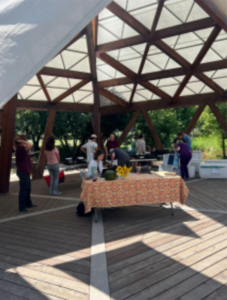SOU participants make a splash at regional sustainability conference
(Ashland, Ore.) — Southern Oregon University students, staff and faculty made their presence felt at last week’s Washington Oregon Cascadia Higher Education Sustainability Conference (WOHESC) in Portland, where SOU participants shared the university’s stories of success in sustainability with peer institutions.
The conference was hosted this year by Portland Community College and was attended by representatives from colleges and universities throughout the Northwest. SOU and its Institute for Applied Sustainability served as one of three “leading host sponsors” for the three-day event, March 5 through 7.
SOU Sustainability Director Becs Walker presented on two of the university’s major successes in the past year: its groundbreaking work on solar installations and commitment to produce 100% of its daytime electricity by 2035; and its development of The Institute for Applied Sustainability, which has brought together sustainability professionals from academic affairs, student life and campus operations to establish sustainability as a pillar of excellence at SOU.
“Southern Oregon University has led efforts to institutionalize sustainability in higher education for more than two decades,” said Vincent Smith, Ph.D., dean of the School of Science and Business. “The invitation to share our successes this year with an audience of more than 300 WOHESC attendees speaks to our continued leadership in this important field.”
Walker said in her presentation that SOU is set apart by its unique partnerships across various areas of campus. Last week’s conference was attended by a diverse group who were drawn together through the SOU Sustainability Council.
“Our success stems from a solutions-focused collaboration driven by student passion,” Walker said.
The Washington Oregon Cascadia Higher Education Sustainability Conference is registered as a Certified B Corporation – a for-profit company that meets established standards for social and environmental performance and accountability, and whose operations benefit all stakeholders. WOHESC is described on its website as “a platform for inspiring change, facilitating action, and promoting collaboration related to sustainability and social justice within the region’s higher education institutions.”
The conference featured a lineup of main stage keynote speakers – PCC President Adrien L. Bennings, author Sarah Jaquette Ray, Portland State University faculty member Judy Bluehorse Skelton and Samoan climate activist Brianna Fruean – along with six plenary speakers and more than 90 session speakers. This year’s conference theme, “Cultivating Sustainable Communities, was an exploration of the intentional care required to build inclusive and resilient communities.
SOU Honors College student Sierra Garrett attended this year’s WOHESC – including a workshop on sustainability student engagement – as a representative of the Associated Students of SOU and Director of Student Engagement for the Institute for Applied Sustainability.
“I love learning from other colleges about how they are engaging students in sustainability, but it is so rewarding to be able to share our work at SOU with others,” she said. “Students I meet from other schools are always amazed by what we are doing at SOU.”
This year’s attendance and sponsorship of WOHESC is an important part of SOU’s Institute for Applied Sustainability’s strategic plan, which emphasizes establishing sustainability education, research and operations as a pillar of excellence for SOU, as a means to recruit students and external funding. IAS staff and faculty fellows have already raised over $12 million to support SOU since the institute’s inception three years ago.
-SOU-





 Recent potato plantings marked a significant step toward fulfilling the summer 2024 CSA Program, a cornerstone initiative of the farm, with crops that have over-wintered now approaching harvest. The CSA program yields high-quality, pesticide-free produce and fosters community engagement by offering subscribing members weekly access to fresh fruits and vegetables grown on The Farm.
Recent potato plantings marked a significant step toward fulfilling the summer 2024 CSA Program, a cornerstone initiative of the farm, with crops that have over-wintered now approaching harvest. The CSA program yields high-quality, pesticide-free produce and fosters community engagement by offering subscribing members weekly access to fresh fruits and vegetables grown on The Farm.




